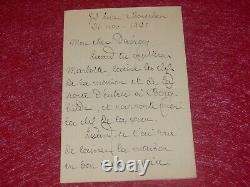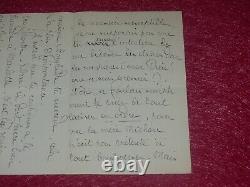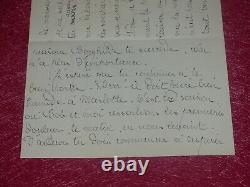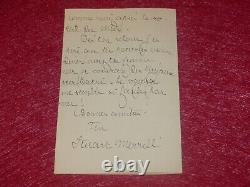
- Homepage
- Author
- Alfred Bruneau (3)
- Auguste Maquet (3)
- Beydts (louis) (4)
- Camille Mauclair (3)
- Charles Monselet (3)
- Chateaubriand (5)
- Colette (3)
- Ernest Daudet (3)
- Eugène Labiche (3)
- Jean Couty (3)
- Jean-léon Gérôme (5)
- Louise Read (4)
- Marcel Proust (5)
- Paul Chabas (4)
- Paul Meurice (3)
- Proust (3)
- Roger Martin Du Gard (4)
- Salomon Reinach (3)
- Sully Prudhomme (7)
- Violette Leduc (4)
- Other (4045)
- Era
- 18th Century (11)
- 1900 To 1960 (63)
- 1960s (5)
- 1970s (7)
- 19th (5)
- 19th Century (49)
- 20th Century (16)
- Beautiful Era (12)
- Belle Epoque (49)
- First Empire (10)
- First World War (4)
- Nineteenth (19)
- Nineteenth Century (11)
- Post-war (23)
- Restoration (17)
- Revolution (4)
- Roaring Twenties (28)
- Second Empire (21)
- Second World War (6)
- World War Ii (9)
- Other (3751)
- Language
- Region
- Subject
- Theme
COLL HENRY DAVRAY AUTOGRAPH LETTER SIGNED STUART MERRILL (American poet) 1901







Coming from the old archives or personal collections of Henry D. One will find, sold individually, numerous letters from Stuart MERRILL in particular, but also from other French or English-language writers of the time, publishers, literary magazine directors, etc.
A signed autograph letter from Stuart MERRILL. 1 sheet of white paper folded in half forming 4pp.
Very good overall condition, clean. Usual folds and minor dirt on edges. Concerning the literary and artistic life of the late 19th and early 20th centuries. His real name is Henry Durand, he is also known under the pen names of Henry Davray. At the beginning of the 20th century, he is a prominent popularizer of English literature by translating and introducing the works of Oscar Wilde, Rudyard Kipling, Frank Harris, H.Wells, Joseph Conrad, or George Meredith. He creates several magazines, the most famous of which is the Anglo-French Review. After World War I, his efforts to promote the spread of English prose make him the most famous Frenchman in literary circles in Great Britain, where he settles in 1940 after being made a Commander of the Order of the British Empire by King George VI. Davray is responsible for the "English Letters" section of the Mercure de France from 1896.
He is the first translator of De Profundis and The Ballad of Reading Gaol by Oscar Wilde in 1898, and he has also translated a large part of H.'s work into French from 1898 to 1912 (including the famous The War of the Worlds). Literary critic, journalist, translator, writer. Henry Durand-Davray, born on August 14, 1873, in Gennevilliers, and died on January 21, 1944, in London, is a French translator and literary critic.
As a specialist in English literature at the prestigious Parisian newspaper Le Mercure de France, he translates the works of H. Wells, Rudyard Kipling, Oscar Wilde, and Yeats into French. During World War I, he serves as a war correspondent and official delegate of the French government.
He is the brother-in-law of the painter Georges Dola. Born to a Vosges father, Jean-Lucien-Henry Durand, a gardener, and an Occitan mother. Former chambermaid then cook, he develops a deep aversion to Germany and an attraction to England, where he spends most of his vacations. He studies English at the Sorbonne but fails to obtain a degree due to his prolonged absences. Nevertheless, he acquires a vast culture that allows him to integrate and evolve in artistic, political, and literary circles in both London and Paris.He meets many writers, especially those belonging to H. Wells' circle: Arnold Bennett and Joseph Conrad. In 1917, he is one of the founders of the Anglo-French Society, whose aim is to promote the Entente Cordiale: his friends affectionately nickname him "the tunnel under the English Channel".
When Oscar Wilde, after being released from prison in 1897, stays in Naples for some time, Henry-D. Davray meets him, having obtained his address, the Villa Giudice in Pausilippe, thanks to Ernest Dowson, a close friend of the writer. The two men meet again by chance when, towards the end of his life, Oscar Wilde is in need. Having had to cancel an appointment to receive him, Wilde asks Davray for money and offers him a dedicated copy of John Webster's The Duchess of Malfi in exchange. Stuart Merrill, an American poet, spends his childhood in Paris, where his father belongs to the United States embassy.At the Lycée Condorcet, he is classmates with some of the future symbolists, including René Ghil, André Fontainas, and Éphraïm Mikhaël, among others. He is captivated by the French language and acquires a very rich poetic culture. There, he becomes the spokesperson for French poetry, particularly Parnassianism, which strongly influences him.
At the same time, he learns the prosody of the English language. He publishes his first collection of poems, Les Gammes (1887), at the time when Mallarmé's circle is forming.
The reference to music is evident, and like most other symbolists, he seeks to use words as notes on a staff, as elementary sounds that would organize themselves into a song. While others, such as Ghil, find innovative techniques, such as verbal instrumentation, to achieve this musicality, Stuart Merrill systematically borrows the alliteration technique from Anglo-Saxon poetry; he quickly shows the limits of such a poetic approach.
Fastes (1891) and Petits Poèmes d'automne (1895) still bear the marks of this prosodic work; however, Stuart Merrill gradually frees himself from all influences: Les Quatre Saisons (1900) are already a much more personal and original evocation. Permanently settled in France since 1890, Merrill writes numerous articles about the symbolists on both sides of the Atlantic and contributes to their appreciation by the public. But, as a great admirer of the American poet Walt Whitman, he develops a much more didactic poetry. Une voix dans la foule (1909) illustrates his love for humanity and his democratic ideal. Language serves his conviction, and he gains a strength that is foreign to his early verses. The manifesto of symbolism, published by Jean Moréas on September 18, 1886, appears while Stuart Merrill is staying in the United States, which he had returned to after his father's death. From there, he corresponds with his French friends and sends his first poems for publication. "Passionate about social justice, involved in the Marxist movement, he was seen in the streets of New York selling leaflets denouncing the 'Four Hundred' of high society... Returning definitively to France, at the height of symbolism, he publishes Les Fastes in 1891 and Les Petits Poèmes d'automne in 1895, opens a salon frequented by symbolists at his home on Quai de Bourbon in Paris, supports Oscar Wilde during his trial, and becomes enthusiastic about the Armenian cause and the defense of Captain Dreyfus. As a collaborator of the magazines La Plume and L'Ermitage, he connects his poetic writing to a political commitment placed under the sign of anarchism. "What makes the strength of the symbolist theory is precisely its anarchy. It only asks the poet to be significant, that is, individual, and to reveal himself, thought and emotion, through images as general as possible.Yes, symbolism is anarchy in literature; instead of shrinking between two dates, like Mr. Zola, or burying oneself alive in a box of mummies, like Mr. Leconte de Lisle, it wanders with its glorious fantasy through lands and ages, and cares little whether the riches it collects come from Golconda or Ophir.
" L'Ermitage, August 1893, p. From this perspective, his attachment to liberated verse and free verse, freed from the constraints of metrics, is understandable. However, beyond the structure, it is the inspiration that lies at the heart of his poetic approach: "The poet's talent alone justifies or condemns his metrics.

